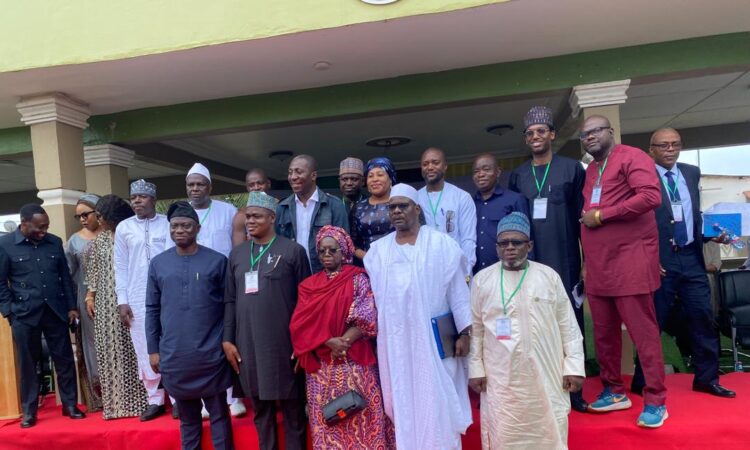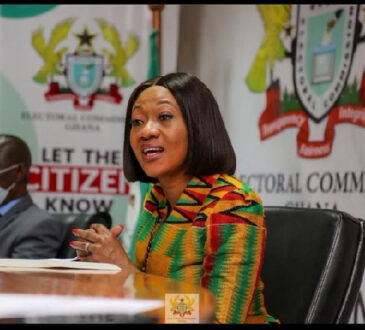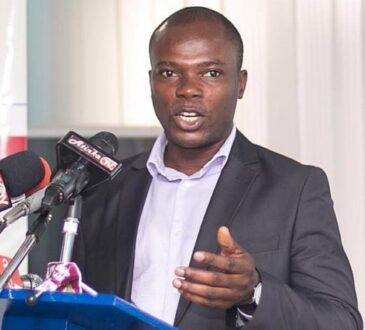
As part of its efforts at address the problem of plastic waste in West Africa, ECOWAS Parliament Joint Committee on Agriculture, Environment and Natural Resources, Energy and Mines, and Committee on Infrastructure, has engaged the people of Winneba on how best to tackle challenges posed by indiscriminate use and dumping of plastic waste.
The meeting which held at the Kojo Beedu Community Centre, Winneba, brought together traditional institutions, Local Council Members, professional groups, civil society organizations, students of tertiary institutions as well as trade unions, to discussions around the theme of the joint meeting, which centered on plastic management and challenges in the implementation of community policy.
The Town Hall meeting afforded community members an opportunity to learn more about the health implications of plastic use as well as their role in the proper management of plastic waste.
Addressing community members, member of Parliament for Effutu and Majority Leader of Ghana’s Parliament, who is also the Head of Ghana’s Delegation to the ECOWAS Parliament and 3rd Deputy Speaker, Alexander Kwamena Afenyo-Markin, said the meeting was crucial to sensitize the community on the significant deliberations of the ECOWAS Parliament’s delocalized meeting.
Noting that the economic cost was staggering, he frowned at the fact that even fishing industry, a vital source of livelihood for many has been hit hard by declining fish stocks due to plastic pollution.
“Rising fish prices in Senegal and a significant drop in fish landings in Ghana are just some examples of the far-reaching impact.
“Health-wise, the presence of plastic waste poses serious risks. It contaminates our food chain, affecting not just our marine life but also the health of our people who consume these contaminated resources. For our farmers, plastic waste in the soil can hinder crop growth and reduce agricultural productivity.”
Despite these challenges however, the lawmaker expressed optimism over some promising prospects. He believed that by addressing plastic waste management head-on, the region can unlock numerous benefits for its respective communities.
“Effective waste management solutions can create jobs, enhance public health and protect our environment. Also, innovative initiatives like Safisana in Ghana, which turns waste into biogas and organic fertilizer, and Recuplast in Senegal, which transforms plastic waste into useful products, offer us a blueprint for success.
“These models demonstrate that with the right investment and commitment, we can turn waste into valuable resources, fostering a circular economy that benefits all.
“As we embark on this journey, let us draw inspiration from the resilience and innovation that define our West African spirit. Let us remember the words of our great poet, Kofi Awoonor, and commit to providing answers to the tough questions posed by the sea and the environment.
“Together, we can transform this crisis into an opportunity for growth, sustainability and unity. Let this town hall meeting be the start of a movement that turns the tide against plastic pollution, creating a legacy of environmental stewardship for future generations”, he said.
Also speaking, a federal lawmaker representing Ede North, Ede South, Egbedore and Ejigbo Federal Constituency of Osun State, Nigeria, Honourable Bamidele Salam, admitted that unfortunately, most African countries have not been able to manage issues affecting environmental sustainability due to lack of awareness and limited resources among others.
“So, in a meeting like this, we should be able to come up with very practical approaches to solving the problem. One of the approaches to solving the problem came out of the interactive session at the Town Hall meeting that held today and that has to do with attitude.
“You know, a lot of people do not really understand that harming the environment through bad attitude in terms of disposal of waste, especially plastic, is harming ourselves. So, the moment people know that this harm actually affects them personally and also affects the future generation, they will begin to have the right attitude to solving the problems.
“But governments of all these countries also have to be more proactive. Environmental sustainability is one of the major goals of the SDGs and countries have signed on to the SDGs.”
Adding: “So, what specific or practical actions are countries of the world mapping out to meet those goals? In most places, we just come with the policy but there are no pragmatic actions, and those actions must also be reviewed, perhaps every two to three years to see how well we have gone.”
Hon Bamidele opined that if rewards were given to communities, states, local government or municipalities, they would be more pragmatic in reducing plastic waste.
“Also, people have to see waste from the viewpoint of opportunities. Waste can be converted into so many things – energy fertilizer and artwork. By the time we start seeing that, we will encourage children in schools who are not economically buoyant to look for opportunities in picking plastics on weekends and sell them to recycling plants and earn more mo ney for their schooling. The earlier we encourage all these, the better”, he said.







